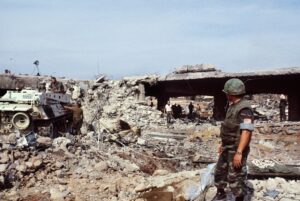The Beirut Barrack Bombings of 1983 were a tragic terrorist attack committed against multinational peacekeeping forces deployed to help stabilize the region and have been very much forgotten and un-talked about. The Clarke Forum lecture on this event was presented by three speakers; Professor Mireille Rebeiz, James G. Breckenridge, provost of the U.S. Army War College, and Michael A. Gaines, a family member of one of the Marines killed in the bombings. This variety of three speakers offered a spectrum of different backgrounds and perspectives on the Beirut Barrack Bombings. Professor Rebeiz started off the lecture by describing Lebanon’s history in short, which had an added layer of knowledge as she was born and raised in Lebanon. She explained the way identity has a very crucial part in Lebanon’s history. There is a great religious diversity in Lebanon, without a predominant majority, which has caused lots of tension in the region. In 1958, the Lebanon crisis led to the U.S. sending their first military aid which was also when the first combat was witnessed in that region. The Professor asked the question of whether that can be considered military aid or invasion and aggression, which was a very interesting way to hint at the difference in U.S. views vs. Lebanon’s on the event. The Professor also explained how deeply impactful the civil war in Lebanon (1975 – 1991) was, as the consequences of this war are still unaccounted for and Lebanon is still under Iranian occupation in many ways.
James G. Breckenridge, the provost of the U.S. Army War College, went on to explain the relationship between the U.S. and Lebanon when it came to peacekeeping and cooperation. He explained the layout of the Beirut U.S. Marine base and explained how on October 23rd, 1983, a yellow Mercedes, carrying over ten thousand pounds of explosives, sped into the barracks housing U.S. Marines in Beirut, Lebanon. Only minutes later, an identical attack happened to the French Paratrooper barracks. This attack killed 241 American military personnel and 58 French military personnel. What I found really interesting was the difference between his and Professor Rebeiz’s lecture, as it deeply relied on their upbringing – one clearly understood that not all foreign aid is truly helpful while the other one promoted very clear pro-U.S. ideals without acknowledging the actual ways the U.S. has caused harm through this. The final speaker was Michael A. Gaines, who had a very touching and personal story to tell about losing his brother and the memorial he and the families of the other killed Marines are building. What I thought was very interesting is how to him the memorial was a way to remember and honor those fallen. In Serbia, most memorials are simply propaganda tools to encourage anti-Western ideologies, so to see someone talk about it that way was very interesting. What I also found very interesting was the very clear nationalism he had. Having also served himself, the way he talked about the U.S. military and the honor to serve one’s country was fascinating. Up until a couple of years ago, there was mandatory military service in Serbia for any man over 18. Most men I know have served and their feelings towards it are much different than the ones the speaker had. What was also very compelling to me was the fact that recently it came out that Hezbollah (Iran-backed Lebanese Shi’a militia) and Iran have been linked to the Beirut Barrack Bombings but due to the Amnesty laws put in place after the war, the culprits cannot be tried or investigated. Overall, the talk was very insightful and compelling, however, very deeply tinted with pro-U.S. ideals by the last two speakers which was interesting to hear as someone from a different country.

Leave a Reply